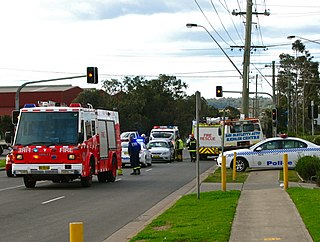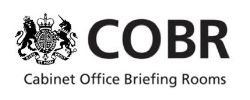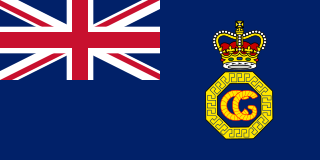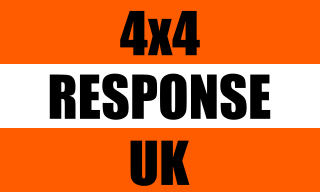
Business continuity may be defined as "the capability of an organization to continue the delivery of products or services at pre-defined acceptable levels following a disruptive incident", and business continuity planning is the process of creating systems of prevention and recovery to deal with potential threats to a company. In addition to prevention, the goal is to enable ongoing operations before and during execution of disaster recovery. Business continuity is the intended outcome of proper execution of both business continuity planning and disaster recovery.

Emergency services and rescue services are organizations that ensure public safety, security, and health by addressing and resolving different emergencies. Some of these agencies exist solely for addressing certain types of emergencies, while others deal with ad hoc emergencies as part of their normal responsibilities. Many of these agencies engage in community awareness and prevention programs to help the public avoid, detect, and report emergencies effectively. Emergency services are often considered first responders, and typically have dedicated emergency vehicles.

An emergency is an urgent, unexpected, and usually dangerous situation that poses an immediate risk to health, life, property, or environment and requires immediate action. Most emergencies require urgent intervention to prevent a worsening of the situation, although in some situations, mitigation may not be possible and agencies may only be able to offer palliative care for the aftermath.

The Cabinet Office Briefing Rooms (COBR) are meeting rooms in the Cabinet Office in London. These rooms are used for committees which co-ordinate the actions of government bodies in response to national or regional crises, or during overseas events with major implications for the UK. It is popularly referred to as COBRA.
The Civil Contingencies Secretariat (CCS), created in July 2001 and disbanded in July 2022, was the executive department of the British Cabinet Office responsible for emergency planning in the UK. The role of the secretariat was to ensure the United Kingdom's resilience against disruptive challenge, and to do this by working with others to anticipate, assess, prevent, prepare, respond and recover. Until its creation in 2001, emergency planning in Britain was the responsibility of the Home Office. The CCS also supports the Civil Contingencies Committee, also known as COBR.

His Majesty's Coastguard (HMCG) is the section of the Maritime and Coastguard Agency responsible, through the Secretary of State for Transport to Parliament, for the initiation and co-ordination of all maritime search and rescue (SAR) within the UK Maritime Search and Rescue Region. This includes the mobilisation, organisation and tasking of adequate resources to respond to persons either in distress at sea, or to persons at risk of injury or death on the cliffs or shoreline of the United Kingdom. Since 2015 it has also been responsible for land-based search and rescue helicopter operations.

The Civil Contingencies Act 2004 (c. 36) is an act of the Parliament of the United Kingdom that makes provision about civil contingencies. It also replaces former civil defence and emergency powers legislation of the 20th century.
The Special Escort Group (Ministry of Defence Police) or SEG (MDP) are a specialised unit of the Ministry of Defence Police. It is primarily responsible for the movement of all nuclear weapons and Defence Special Nuclear Material within the United Kingdom.
A gold–silver–bronze command structure is a command hierarchy used for major operations by the emergency services of the United Kingdom.
The New Zealand Co-ordinated Incident Management System (CIMS) is New Zealand's system for managing the response to an incident involving multiple responding agencies. Its developers based the system on California's Incident Command System (ICS) - developed in the 1970s - and on other countries' adaptations of ICS, such as Australia's Australasian Inter-Service Incident Management System (AIIMS).
The New Zealand Fire Service was New Zealand's main firefighting body from 1 April 1976 until 1 July 2017 – at which point it was dissolved and incorporated into the new Fire and Emergency New Zealand.

The fire services in the United Kingdom operate under separate legislative and administrative arrangements in England and Wales, Northern Ireland, and Scotland.
Police tactical group (PTG) is the generic term used to refer to highly trained Australian and New Zealand police tactical units that tactically manage and resolve high-risk incidents, including sieges, armed-offender situations and terrorist incidents.
ETHANE is a mnemonic indicating a protocol used by emergency services to report situations which they may be faced with, especially as it relates to major incidents, where it may be used as part of their emergency action principles. An alternative mnemonic METHANE adds an additional prompt "Major Incident Declared?" to ensure consideration is given to if the response may challenge the available resources and so necessitate initiating contingency plan measures.
MTPAS is a procedure in the UK for prioritising access to the mobile telephone networks for privileged persons. It replaced ACCOLC in 2009.
The Emergency Data Exchange Language (EDXL) is a suite of XML-based messaging standards that facilitate emergency information sharing between government entities and the full range of emergency-related organizations. EDXL standardizes messaging formats for communications between these parties. EDXL was developed as a royalty-free standard by the OASIS International Open Standards Consortium.

4x4 Response is a UK based charity whose volunteers offer the use of their 4x4 vehicles to provide logistic support in adverse conditions, working with other Voluntary Organisations and the blue-light emergency services. The Charity was set up to assist or facilitate 4x4 drivers that wanted to form a group in an area where there was no group currently in existence. The charity itself, while largely consisting of volunteers, in itself, is not a response group.
The Hazardous Area Response Team (HART) is a capability of the NHS ambulance services in the United Kingdom devoted to providing paramedic and enhanced medical care to patients in the "hot zone" of hazardous environments.
Emergency planning in Wales is carried out in line with the Civil Contingencies Act 2004 however as a result of devolution it is managed with its own ‘welsh flavour.’ For instance there are unique bodies operating in Wales like The Joint Emergency Services Group (JESG) and there is involvement from The Welsh Government.
ISO 22300:2021, Security and resilience – Vocabulary, is an international standard developed by ISO/TC 292 Security and resilience. This document defines terms used in security and resilience standards and includes 360 terms and definitions. This edition was published in the beginning of 2021 and replaces the second edition from 2018.







